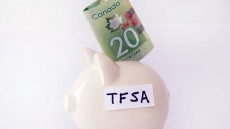EDMONTON — Premier Rachel Notley's NDP government is taking over Alberta's finances with more than $1 billion in surplus cash, according to figures released Tuesday.
But Finance Minister Joe Ceci said challenges lie ahead as the current fiscal year will be the first full reporting period with oil at drastically reduced prices.
"The oil (price per) barrel is under $60 on average every day," Ceci said Tuesday.
"That has to be taken into consideration about the impact on our revenues and ability to project where we're going to be at the end of the year."
The final numbers from the 2014-15 budget year, which ended March 31, show Alberta recorded a $1.1-billion surplus, up from the $514 million projected when the Progressive Conservative government tabled its spending document in the spring of 2014.
West Texas Intermediate oil, Alberta's benchmark for crude, has dropped to below US$60 a barrel from US$107 a barrel one year ago.
The 2014-15 budget is the first surplus in six years.
The extra revenue came from diverse sources, including more tax money and higher-than-expected investment income.
Total revenue for the year was $49.5 billion, while total spending was $48.4 billion.
Total debt for capital spending was $11.9 billion, while the rainy-day savings contingency account is $8.2 billion.
The long-term Heritage Savings Trust Fund is valued at $18 billion.
Alberta is currently between budgets.
The Tories introduced a budget March 26, but lost to the NDP in the May 5 election before it passed. Ceci is to introduce a budget in October to reflect savings promises and priorities from the NDP campaign.
The Notley government has passed a bill to keep $18.5 billion in government money flowing. It has also announced $624 million in new spending to cover higher class size enrolment and more money for health care and social programs.
Ceci declined to comment on statements from Notley that she expects the October budget will include the $5.4-billion deficit projected by the NDP during the election.

He also suggested the $8.2-billion contingency fund would not automatically be used to cover any shortfall.
"Philosophically, I think contingencies are there to smooth things out. They're not there to totally drain the bank account."
Wildrose finance critic Derek Fildebrandt said the final numbers are symptomatic of a larger problem, noting Alberta's net financial assets have dropped $20 billion over eight consecutive years.
"When you collect record revenues and still have to take out billions in debt, the real problem is overspending,” said Fildebrandt in a news release.
“The NDP plan of raising spending faster than they can raise taxes just isn’t sustainable."
Fildebrandt was referring to moves the New Democrats have already made to change the course of Alberta's finances.
In the spring sitting of the legislature, the government passed a bill to increase taxes on large corporations to 12 per cent from 10 per cent and raise personal income taxes on those making more than $125,000 a year.
Tuesday's reporting of numbers reflected changes in accounting.
The government moved to a consolidated system in March that included, among other categories, pension liabilities as well as revenues and expenses from such Crown-controlled organizations as schools and health organizations.
Under the old system, Alberta forecast and reported a $1.1-billion surplus when the budget was tabled. Under those accounting rules, the final number would have been $1.4 billion.
Ceci said the government has not decided if it will stay with consolidated budgeting, but noted the auditor general recommends doing so.



